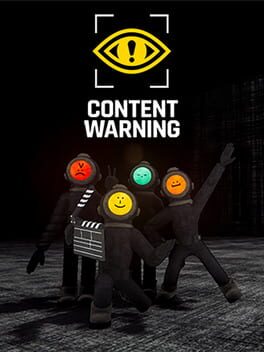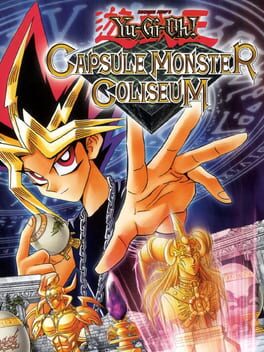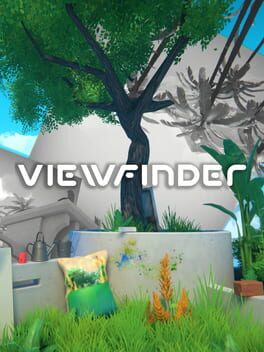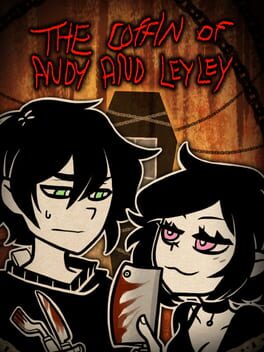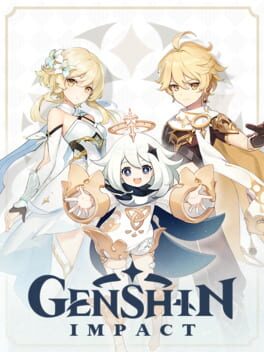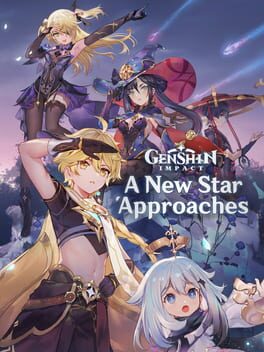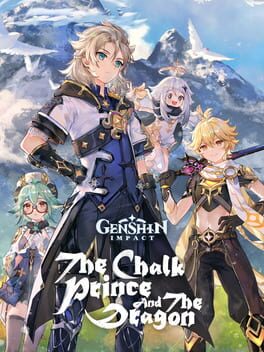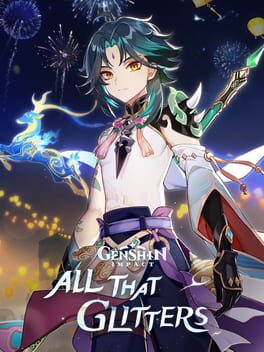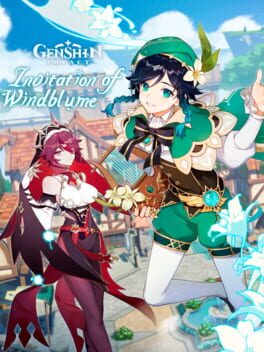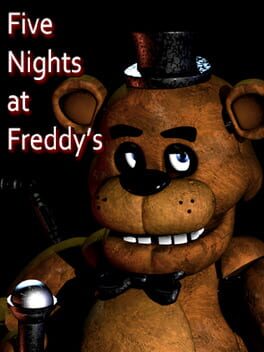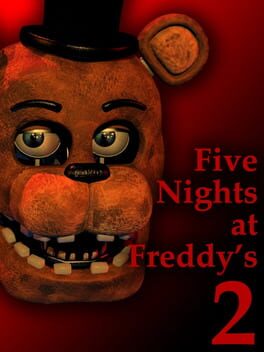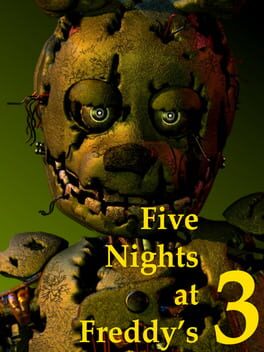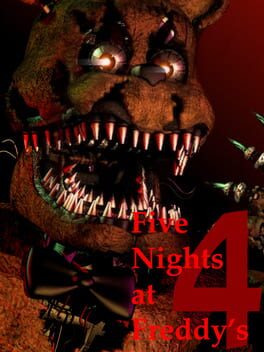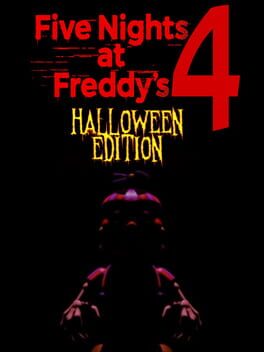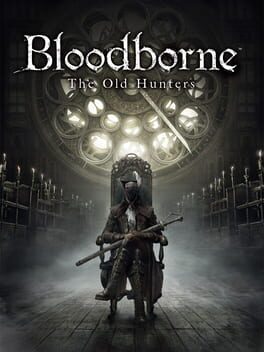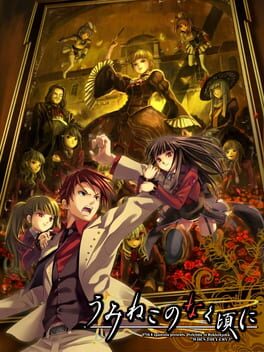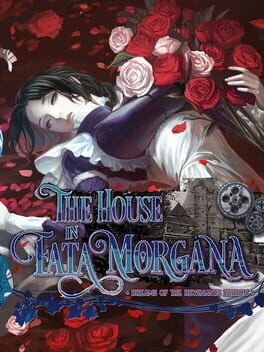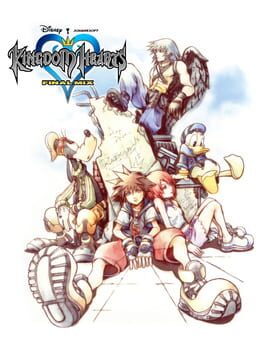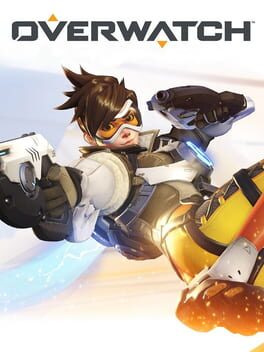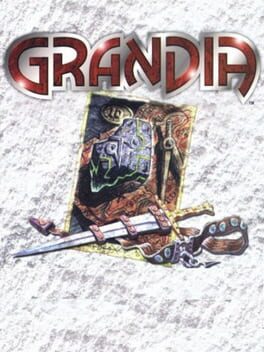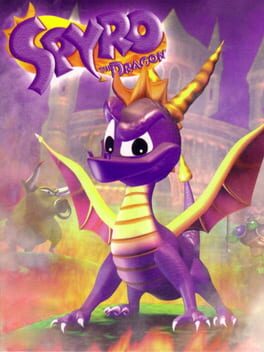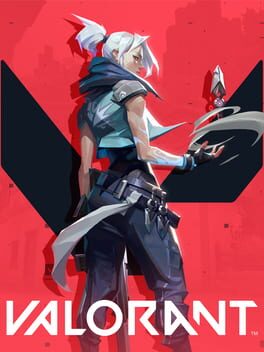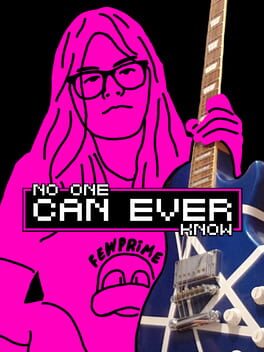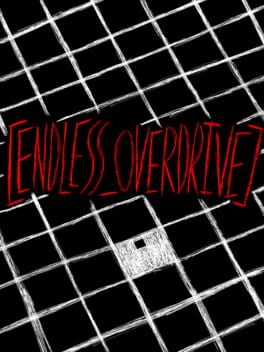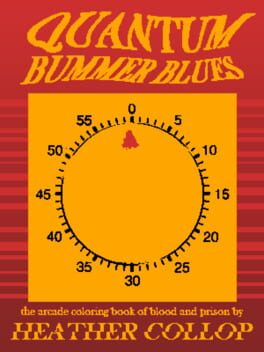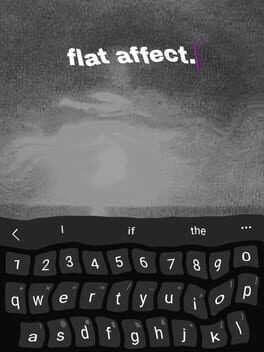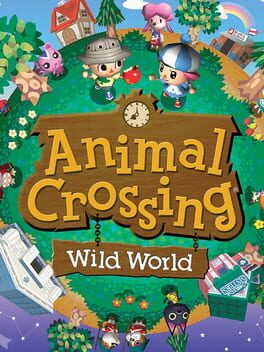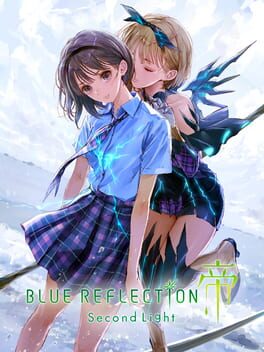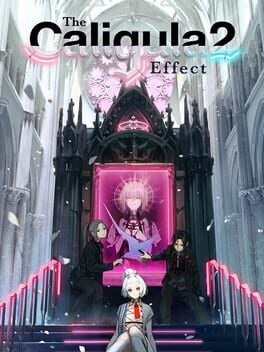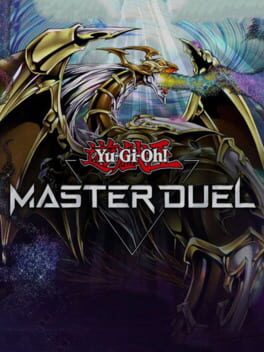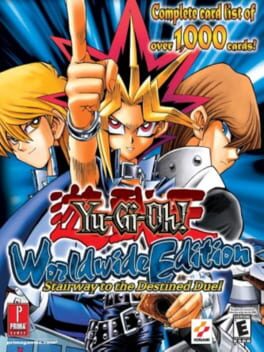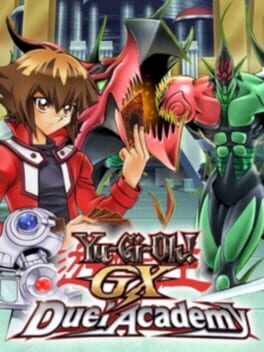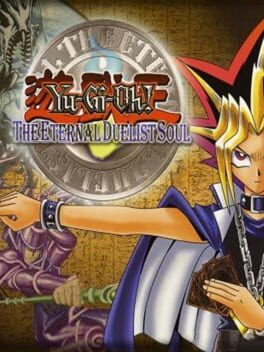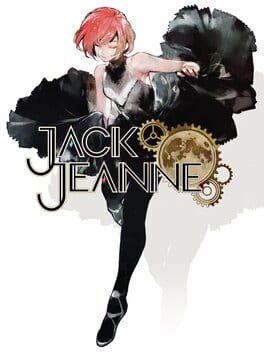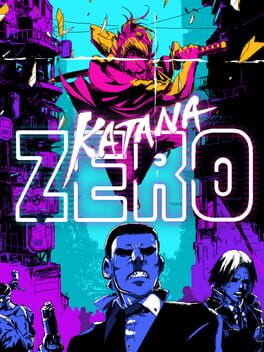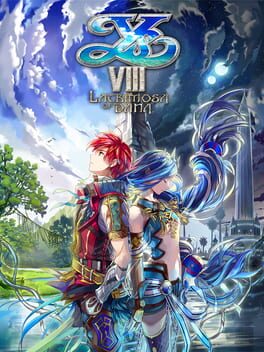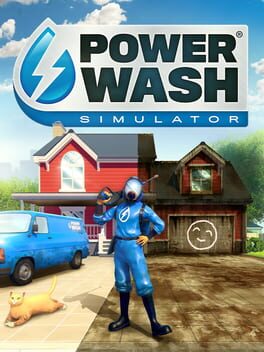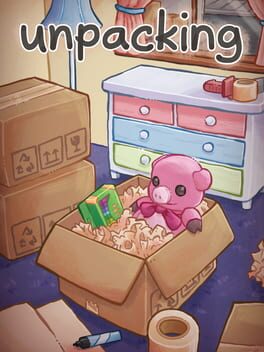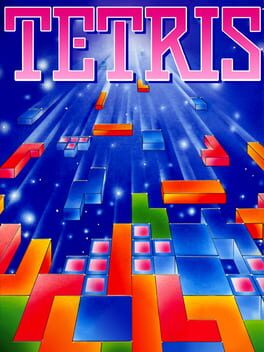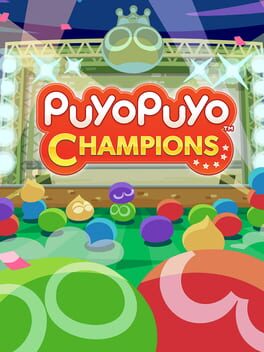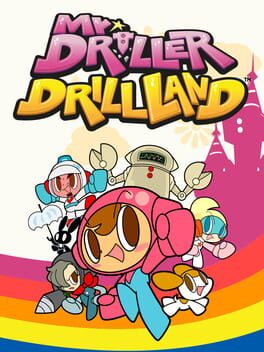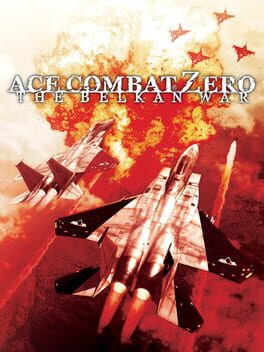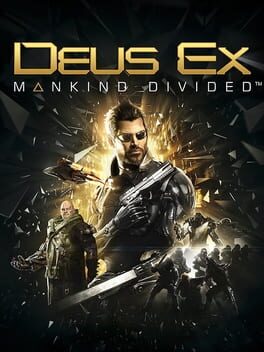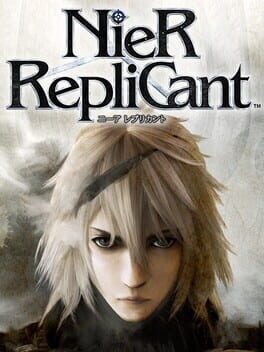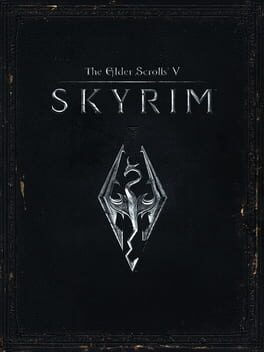260 reviews liked by karamatsu
Content Warning
2024
Here come the Lethal Company spinoffs!
To be fair though, this game has a pretty compelling hook! Forcing you to literally confront the monsters within for views makes this potentially scarier than Lethal Company, and the videos are HILARIOUS to watch afterwards! The bugs need a lot of work before people start having to pay for this, though.
To be fair though, this game has a pretty compelling hook! Forcing you to literally confront the monsters within for views makes this potentially scarier than Lethal Company, and the videos are HILARIOUS to watch afterwards! The bugs need a lot of work before people start having to pay for this, though.
Finished 3/9/2024
And with that most of the 'Duel Monsters' era titles have been covered. The only ones left are some of the earlier game boy titles but I'll cover those last probably, for now say goodbye to Yugi on the cover here.
Between this, Final Fantasy Tactics, Tactics Ogre and now Unicorn Overlord- I've been sort of on a tactics binge (been also looking to check out Front Mission). Strange that not only is Yu-Gi-Oh a pillar of my tactics understanding but its probably now the 2nd largest thus far behind Fire Emblem. With the lack of innovation there is in the card game during this era of YGO, I can't say the same for the games during this era as this is another distinct tactics game for the series. I had half expected this to be similar to how Duelist of the Roses operated but here we don't have nearly as...unique of a concept, but I think something slightly more enjoyable and also surprisingly higher budget.
I was shocked opening this game up and being greeted by Gramps, fully voiced! Prior to this I don't recall there being any voice acting whatsoever in any of the console titles so I was pleasantly surprised when this game had, like, FULL voice acting. There's not much of a story this time around but seeing the characters voice out interactions throughout a battle was a nice throwback to when I watched the anime as a kid.
In addition, this game has a strong premise with regards to its tactics. The objective is the usual- you have a base from which you select and summon a number of units, defeat all of your opponents capsules or defeat the base to win. However, each match has a 'deck limit' of sorts that limits you from taking in only your strongest and generally this isn't an issue as most of the game is utilizing monsters with advantageous attributes to stomp opponents. One thing to note is that there's eight attributes but these interact moreso in two 'wheels' of sorts.
Long story short:
Water > Fire > Grass > Wind > Water
Dark > Earth > Electric > Light > Dark
This leads to some interesting match-ups later on as Light focused duelists will incorporate Earth units as well in an attempt to counter Electric units you bring out.
Units are also fairly interesting in how they move around- generally tactics games have a 'movement' skill in which they operate off a radius on the game's grid. Here it feels more like Chess than fire emblem ever did as units are locked into specific patterns of movement, most akin to Rooks and Bishops moving horizontally or diagonally. There aren't any Knight patterns but a 2-square 'leap' movement in which a unit can hop in any direction but only 2 squares away (more of a dotted O movement than an L). On top of this, units have distinct attack patterns separate from their movement patterns so a unit may have diagonal movement but horizontal attack capabilities.
There are several other variables that arise during play, certain arenas will have a gimmick that alters elements of the field over time, certain tiles give a bonus to specific types, your base that you choose at the start of the game gives a passive buff, it was a much more intriguing game than I had initially thought.
There is a lot of obfuscation that bogs down the experience, on top of being an already clunky to understand tactics game at first. Certain mechanics like Fusion and Evolution require some prior knowledge of both the card game and also some creative thinking (game FAQs). In addition certain stage elements don't really tell you what's going on. Most of it can be inferred, but for example during Tea's stage the lights of the city dim down as the clock strikes midnight- snow begins to fall and holiday music begins to play... I don't really know if this has any effect, like giving your dark monsters a boost but uhhh it was pretty cool!
Lastly while leveling your units is imperative, you get units after battle based off what your opponent owns on top of Grandpa updating his shop roster after you beating each set of five duelists (with some shadow drops I never quite understood). It's important to note that the units you have early on can be useful later on, even if just to fill in gaps and use as cannon fodder as permadeath is not a factor here- thank god. The issue isnt really these cannon fodder but its moreso the mid units that land in a weird limbo where I can't tell if they've been powercreeped out by the new capsules or if I haven't put in the effort to make it good. In my playthrough I ran a Water base and used a number of water units in the start- namely Root Water. This would be my highest level unit for most the game but its usefulness waned as I couldn't find a good place to evolve it into High Tide Gyojin until the last couple of maps. Certainly once it evolved it was actually still comparable to most of the late game units but its just that weird predicament of not really knowing whats 'good' for your point in the game- leading to me buying a lot of new, but untrained units that might not have been all that necessary with proper planning.
Overall I was fairly surprised with how much I enjoyed this over Duelist of the Roses, and nearly most of the other Yugioh titles. While DotR might offer something more akin to a 'card-tactics fusion', Capsule Monster Coliseum feels more balanced and properly structured as a tactics title overall. Played this on my Steam Deck and while there were a few visual issues, especially with certain portraits- many of the stages look pretty great, the fully voiced dialogue is well appreciated and the music is pretty good overall. The thing that kinda tipped this over Duelist of the Roses was thinking about how I left off that game not having gone through Kaiba's (Rosenkreuz) route. Despite this, finishing CMC I found myself more likely to restart my progress and retackle prior stages with a better understanding, or hell try out a playthrough with a different, more useful base 'attribute'. I clocked in around 15 hours by the end, with a few half hours lost due to shoddy attempts so honestly for a tactics game as quick and as neat as this I can't be too upset by some perplexities in its mechanics. I'm glad that one of Konami's experiments to the YGO gaming formula paid off as well, just kind of a shame this also happens to be one of the last of its ilk.
And with that most of the 'Duel Monsters' era titles have been covered. The only ones left are some of the earlier game boy titles but I'll cover those last probably, for now say goodbye to Yugi on the cover here.
Between this, Final Fantasy Tactics, Tactics Ogre and now Unicorn Overlord- I've been sort of on a tactics binge (been also looking to check out Front Mission). Strange that not only is Yu-Gi-Oh a pillar of my tactics understanding but its probably now the 2nd largest thus far behind Fire Emblem. With the lack of innovation there is in the card game during this era of YGO, I can't say the same for the games during this era as this is another distinct tactics game for the series. I had half expected this to be similar to how Duelist of the Roses operated but here we don't have nearly as...unique of a concept, but I think something slightly more enjoyable and also surprisingly higher budget.
I was shocked opening this game up and being greeted by Gramps, fully voiced! Prior to this I don't recall there being any voice acting whatsoever in any of the console titles so I was pleasantly surprised when this game had, like, FULL voice acting. There's not much of a story this time around but seeing the characters voice out interactions throughout a battle was a nice throwback to when I watched the anime as a kid.
In addition, this game has a strong premise with regards to its tactics. The objective is the usual- you have a base from which you select and summon a number of units, defeat all of your opponents capsules or defeat the base to win. However, each match has a 'deck limit' of sorts that limits you from taking in only your strongest and generally this isn't an issue as most of the game is utilizing monsters with advantageous attributes to stomp opponents. One thing to note is that there's eight attributes but these interact moreso in two 'wheels' of sorts.
Long story short:
Water > Fire > Grass > Wind > Water
Dark > Earth > Electric > Light > Dark
This leads to some interesting match-ups later on as Light focused duelists will incorporate Earth units as well in an attempt to counter Electric units you bring out.
Units are also fairly interesting in how they move around- generally tactics games have a 'movement' skill in which they operate off a radius on the game's grid. Here it feels more like Chess than fire emblem ever did as units are locked into specific patterns of movement, most akin to Rooks and Bishops moving horizontally or diagonally. There aren't any Knight patterns but a 2-square 'leap' movement in which a unit can hop in any direction but only 2 squares away (more of a dotted O movement than an L). On top of this, units have distinct attack patterns separate from their movement patterns so a unit may have diagonal movement but horizontal attack capabilities.
There are several other variables that arise during play, certain arenas will have a gimmick that alters elements of the field over time, certain tiles give a bonus to specific types, your base that you choose at the start of the game gives a passive buff, it was a much more intriguing game than I had initially thought.
There is a lot of obfuscation that bogs down the experience, on top of being an already clunky to understand tactics game at first. Certain mechanics like Fusion and Evolution require some prior knowledge of both the card game and also some creative thinking (game FAQs). In addition certain stage elements don't really tell you what's going on. Most of it can be inferred, but for example during Tea's stage the lights of the city dim down as the clock strikes midnight- snow begins to fall and holiday music begins to play... I don't really know if this has any effect, like giving your dark monsters a boost but uhhh it was pretty cool!
Lastly while leveling your units is imperative, you get units after battle based off what your opponent owns on top of Grandpa updating his shop roster after you beating each set of five duelists (with some shadow drops I never quite understood). It's important to note that the units you have early on can be useful later on, even if just to fill in gaps and use as cannon fodder as permadeath is not a factor here- thank god. The issue isnt really these cannon fodder but its moreso the mid units that land in a weird limbo where I can't tell if they've been powercreeped out by the new capsules or if I haven't put in the effort to make it good. In my playthrough I ran a Water base and used a number of water units in the start- namely Root Water. This would be my highest level unit for most the game but its usefulness waned as I couldn't find a good place to evolve it into High Tide Gyojin until the last couple of maps. Certainly once it evolved it was actually still comparable to most of the late game units but its just that weird predicament of not really knowing whats 'good' for your point in the game- leading to me buying a lot of new, but untrained units that might not have been all that necessary with proper planning.
Overall I was fairly surprised with how much I enjoyed this over Duelist of the Roses, and nearly most of the other Yugioh titles. While DotR might offer something more akin to a 'card-tactics fusion', Capsule Monster Coliseum feels more balanced and properly structured as a tactics title overall. Played this on my Steam Deck and while there were a few visual issues, especially with certain portraits- many of the stages look pretty great, the fully voiced dialogue is well appreciated and the music is pretty good overall. The thing that kinda tipped this over Duelist of the Roses was thinking about how I left off that game not having gone through Kaiba's (Rosenkreuz) route. Despite this, finishing CMC I found myself more likely to restart my progress and retackle prior stages with a better understanding, or hell try out a playthrough with a different, more useful base 'attribute'. I clocked in around 15 hours by the end, with a few half hours lost due to shoddy attempts so honestly for a tactics game as quick and as neat as this I can't be too upset by some perplexities in its mechanics. I'm glad that one of Konami's experiments to the YGO gaming formula paid off as well, just kind of a shame this also happens to be one of the last of its ilk.
Viewfinder
2023
I dunno, maybe I’m being too harsh but while this is impressive technically, I didn’t get that much more out of it. Viewfinder has some great ideas, but it barely develops them. It’s also really, really easy. Like, I didn’t have to think that much on any of these. This would be much more bearable if the vibe and dialogue of the game wasn’t just so uninteresting to me. Take Superliminal I guess, that game also has trouble developing its ideas and also is very easy. But that game has a sense of comedy that defines it, and so I still had a great time with it! Viewfinder on the other hand, really doesn’t have much for me. These all come together to create an experience that had me with my own music playing instead of what I found to be a very uninteresting soundtrack, breezing through every puzzle and occasionally saying “wow how’d they do that” while the game proceeds to abandon that cool thing that it just did. Definitely admire the basis for the game, again it is quite impressive on a technical level, but just kinda makes me sad.
Viewfinder
2023
Incredible mechanics. Decent difficulty despite some weird level design bs? Way too easy and doesn't build on its mechanics at all. You will use it for a chain of levels and it's forgotten later on. That said, the last level having a timer is dumb.
Great artistic direction and soundtrack too. Just a good game to look at (literally).
I'd write more about the issues on the narrative but I honestly couldn't care at all for the plot or the characters. I don't mind the """""""subtle""""""""" hints to storytelling but it isn't used properly here, especially when I can just ignore it. Also not a fan of it being a simulation, it could've been just a weird ass world and I'd love it for that
Great artistic direction and soundtrack too. Just a good game to look at (literally).
I'd write more about the issues on the narrative but I honestly couldn't care at all for the plot or the characters. I don't mind the """""""subtle""""""""" hints to storytelling but it isn't used properly here, especially when I can just ignore it. Also not a fan of it being a simulation, it could've been just a weird ass world and I'd love it for that
Viewfinder
2023
"Maybe you find a barcode laying around and then you put it down and it turns into a forest!"
"Ah cool. And what does the forest do? Do you solve a puzzle with it?"
"No. But it's cool!!"
- Viewfinder's entire vibe.
The very first moment you place a 2D photo in the world and see it come alive in 3D is genuinely rad. And the game is full of those kind of "wow neat" moments. Sadly, the game as a whole never really amounts to more than a series of cool moments in a mostly pretty easy puzzle game.
The idea for this game was so good. The core mechanic of taking and using photos to manipulate the world around you to solve puzzles is dope! But it almost feels like the devs didn't fully know what to do with the idea after they thought of it so they made a bunch of puzzles and then decided to tell a pretty random story I did not care about with some bad voice-over I wish I could've skipped.
+ Really cool and unique game mechanic
+ Some neat moments that had me go "Oooo cool"
+ Some decent puzzle-solving
- Story's uninteresting and voice acting is not great
- The 2D to 3D translation can feel a bit unpredictable and finicky sometimes.
- Puzzles are generally pretty easy
- Lots of random cool things around the world to showcase the mechanics but are rarely actually used in puzzles
- Last level in the game is randomly timed!!? Why??
"Ah cool. And what does the forest do? Do you solve a puzzle with it?"
"No. But it's cool!!"
- Viewfinder's entire vibe.
The very first moment you place a 2D photo in the world and see it come alive in 3D is genuinely rad. And the game is full of those kind of "wow neat" moments. Sadly, the game as a whole never really amounts to more than a series of cool moments in a mostly pretty easy puzzle game.
The idea for this game was so good. The core mechanic of taking and using photos to manipulate the world around you to solve puzzles is dope! But it almost feels like the devs didn't fully know what to do with the idea after they thought of it so they made a bunch of puzzles and then decided to tell a pretty random story I did not care about with some bad voice-over I wish I could've skipped.
+ Really cool and unique game mechanic
+ Some neat moments that had me go "Oooo cool"
+ Some decent puzzle-solving
- Story's uninteresting and voice acting is not great
- The 2D to 3D translation can feel a bit unpredictable and finicky sometimes.
- Puzzles are generally pretty easy
- Lots of random cool things around the world to showcase the mechanics but are rarely actually used in puzzles
- Last level in the game is randomly timed!!? Why??
Viewfinder
2023
Dark Souls 2 is an interesting game. It has a great many mechanics that people, including myself, struggle with. It definitely plays pretty differently to DS1, especially in the early game. I was initially super frustrated with stuff like the health penalty or the sheer number of enemies per level (I do enjoy the thematic importance of the health penalty, but it definitely didn't help my early game experience of beating my head over and over). But I feel like once I actually got past the first area, and got an item that was able to mitigate the health penalty, I started to enjoy it a lot more.
Dark Souls 2 is a different game to 1 immediately in terms of the world design. You get the ability to warp anywhere from the outset, and so each area ends up feeling more disconnected from the whole. But I think this really works for what 2 is going for! One thing I really enjoy about this game is that is that the vibes of the world while being very atmospheric and cool, also can change quite a bit depending where you are. At the end of the day, a souls game is an adventure game where you go through many areas vanquishing bosses and overcoming your inexperience, and to that end Dark Souls 1 had a clear artistic vision with its interconnected and cohesive world where everything fit together somehow, but I think 2 being disconnected also works because I feel like the game has a general dream-like quality to it that I think its world design contributes to. Some of the areas being next to each other makes just like no sense but I think I enjoy that, because it manages to continually make the areas feel different and you never feel safe, you never feel like it falls into a pattern. They all feel isolated and in their own pocket and I feel like this makes the areas feel that much more creepy and fantastical. Which really helps.
The atmosphere and vibes of the world in general are awesome. It feels like each time you discover something you've found something that isn't right, that doesn't feel comfortable. Which yeah, it's not supposed to and it rules. I think it helps even more that the rules of the lore of DS1 are played fast and loose with, because I feel like the cryptic storytelling of Dark Souls fits with this perfectly. Not just because I feel like the freedom afforded by this allows Dark Souls 2's general narrative to come into its own in a really good way - it is able to build on the general framing of Dark Souls 1 and uses it to build and enhance on its themes that manages to create something I actually care about a fair bit and think is philosophically awesome - it also means that Dark Souls 1's events feel like this half forgotten dream, that adds further to the unsettling vibes of the areas in general. Events are not that set in stone and they're not supposed to be in a world where thousands of years can pass before you get to see their effects. And they loom like this shadow of myth that I think really perfectly captures a really unique approach to the feel of a world where gods and monsters and magic continually influence it that I don't think I've seen very much. I don't know how better to explain why the atmosphere is this good, but it's just really cool. I haven't been commenting on the individual lore of this series so far because I didn't find a good place to, but I really also enjoy piecing together this world from item descriptions, cryptic NPC dialogue, etc. It makes me feel like an archeologist observing a world where there are a million things more important than me.
Now when it comes to the gameplay of this game, I feel like I don't have much new things to say about why the loop of this hyper difficult style of game appeals to me so much that I didn't already say in the previous review for DS1. So I'll instead jump into trying to describe why DS2 was a more fun game to me than 1. DS2 may have some bad mechanics but it also has some awesome ones. Power stancing added a whole new dimension to this game that made me care a lot more about my weapons in general. Stat reallocation actually allowed me to strategize much more interestingly as I would use different loadouts for different bosses and I'm so stoked I was allowed to do this. There are definitely some other mechanics I am not mentioning, too.
The area design of DS2 is also just, really enjoyable, and I'd say on an individual level even better than 1? It feels more Zelda coded than 1, in some areas even very directly, which was a big plus for me as a big Zelda fan. But in general I feel like, the 50 million enemies notwithstanding (which I do understand is a big issue), that they're more satisfying to overcome and traverse.
The bosses are probably similar in quality to 1. Overall it has a slight edge over DS1 I think, but only slight, considering it has much more than 1 and as a result also has more bad bosses than 1. But it isn't a number that is unforgivable to me, so it's fine.
The DLC is the one area I would make an exception for the above point. Even with each DLC optional area and optional boss that managed to be just. really miserable. The main parts of all of the three DLC were so good that I don't care. The bosses are all just fucking awesome and the areas are so so fun to go through, definitely my favourite areas in the series so far and having my favourite bosses in the series so far.
Overall I'd say the reason I prefer 2 to 1 is that it has a lot of little differences that coalesce into a game that's much more sricore as a result. Cannot wait to play the rest of the series.
Dark Souls 2 is a different game to 1 immediately in terms of the world design. You get the ability to warp anywhere from the outset, and so each area ends up feeling more disconnected from the whole. But I think this really works for what 2 is going for! One thing I really enjoy about this game is that is that the vibes of the world while being very atmospheric and cool, also can change quite a bit depending where you are. At the end of the day, a souls game is an adventure game where you go through many areas vanquishing bosses and overcoming your inexperience, and to that end Dark Souls 1 had a clear artistic vision with its interconnected and cohesive world where everything fit together somehow, but I think 2 being disconnected also works because I feel like the game has a general dream-like quality to it that I think its world design contributes to. Some of the areas being next to each other makes just like no sense but I think I enjoy that, because it manages to continually make the areas feel different and you never feel safe, you never feel like it falls into a pattern. They all feel isolated and in their own pocket and I feel like this makes the areas feel that much more creepy and fantastical. Which really helps.
The atmosphere and vibes of the world in general are awesome. It feels like each time you discover something you've found something that isn't right, that doesn't feel comfortable. Which yeah, it's not supposed to and it rules. I think it helps even more that the rules of the lore of DS1 are played fast and loose with, because I feel like the cryptic storytelling of Dark Souls fits with this perfectly. Not just because I feel like the freedom afforded by this allows Dark Souls 2's general narrative to come into its own in a really good way - it is able to build on the general framing of Dark Souls 1 and uses it to build and enhance on its themes that manages to create something I actually care about a fair bit and think is philosophically awesome - it also means that Dark Souls 1's events feel like this half forgotten dream, that adds further to the unsettling vibes of the areas in general. Events are not that set in stone and they're not supposed to be in a world where thousands of years can pass before you get to see their effects. And they loom like this shadow of myth that I think really perfectly captures a really unique approach to the feel of a world where gods and monsters and magic continually influence it that I don't think I've seen very much. I don't know how better to explain why the atmosphere is this good, but it's just really cool. I haven't been commenting on the individual lore of this series so far because I didn't find a good place to, but I really also enjoy piecing together this world from item descriptions, cryptic NPC dialogue, etc. It makes me feel like an archeologist observing a world where there are a million things more important than me.
Now when it comes to the gameplay of this game, I feel like I don't have much new things to say about why the loop of this hyper difficult style of game appeals to me so much that I didn't already say in the previous review for DS1. So I'll instead jump into trying to describe why DS2 was a more fun game to me than 1. DS2 may have some bad mechanics but it also has some awesome ones. Power stancing added a whole new dimension to this game that made me care a lot more about my weapons in general. Stat reallocation actually allowed me to strategize much more interestingly as I would use different loadouts for different bosses and I'm so stoked I was allowed to do this. There are definitely some other mechanics I am not mentioning, too.
The area design of DS2 is also just, really enjoyable, and I'd say on an individual level even better than 1? It feels more Zelda coded than 1, in some areas even very directly, which was a big plus for me as a big Zelda fan. But in general I feel like, the 50 million enemies notwithstanding (which I do understand is a big issue), that they're more satisfying to overcome and traverse.
The bosses are probably similar in quality to 1. Overall it has a slight edge over DS1 I think, but only slight, considering it has much more than 1 and as a result also has more bad bosses than 1. But it isn't a number that is unforgivable to me, so it's fine.
The DLC is the one area I would make an exception for the above point. Even with each DLC optional area and optional boss that managed to be just. really miserable. The main parts of all of the three DLC were so good that I don't care. The bosses are all just fucking awesome and the areas are so so fun to go through, definitely my favourite areas in the series so far and having my favourite bosses in the series so far.
Overall I'd say the reason I prefer 2 to 1 is that it has a lot of little differences that coalesce into a game that's much more sricore as a result. Cannot wait to play the rest of the series.
The cool thing about being an adult is that you can look at a game with a ton of Discourse surrounding it, and just play it for yourself because you know that fiction is allowed to include Dark topics, and what matters is how its handled
The Coffin of Andy and Leyley is........fine. Almost unremarkable if you remove the Discourse. The gameplay is peak bog standard RPG Maker walk and talking, where you press space on an object and maybe pick it up to bring it somewhere else. The kind that's perfectly servicable but occasionally slows the pacing down if you can't figure out what to interactive with, and therefore just start trying everything. If you take a break from the game and come back, you might stumble trying to remember where you left off
The writing is unabashedly edgy, and I think it would still be very polarizing without all the dialogue about Ashley wanting to fuck her brother. I actually found myself reminded a lot of Jhonen Vasquez's work, which I will admit I haven't read since I was 15 so maybe my memory is off, where they share that same slightly immature and incredibly cynical strain of humour that occasionally falls into the territory of trying too hard. There's a scene where you're in a public park and if you interact with a tree, the game is like "you picked up: used condom - you decide not to bring it with you". There's an billboard advert that says "are you tired of being alive? ask your doctor about euthanasia today!". Maybe RPG Maker is slightly to blame for this but a part of me is surprised Andy & Leyley came out in 2023, because it really feels like something that would've been made while I was in High School, and that someone like me would've loved back then
As for the incest stuff, I do think it's a bit disingenous to say "oh it's just a bad ending" when Ashley makes repeated comments that boil down to "I would like to fuck my brother". You don't need to justify your enjoyment of the game with "actually, it's a commentary on toxic relationships", because sure it is, but the game never really commits to it and that's fine! you're allowed to like this because it's a bit edgy and fucked up, that is okay. Alternatively, there's nothing wrong with saying "I'm not a prude but the gameplay is boring and the writing tries too hard"
I do think the game struggles a little bit with knowing what it wants to be, and because of that, it tends to go in circles sometimes. I did find myself getting surprisingly invested in the world and the characters, but kept wanting more since each episode length is pretty short so far. I wanna see more consequences for the fucked up things these characters do and feel, but maybe that'll be in the later chapters. I will say, the artstyle is very nice - every character is very expressive with their portraits. You can tell you're in a world of RPG Maker tiles but I think they make the most of it and the artstyle is there too
The Coffin of Andy and Leyley is........fine. Almost unremarkable if you remove the Discourse. The gameplay is peak bog standard RPG Maker walk and talking, where you press space on an object and maybe pick it up to bring it somewhere else. The kind that's perfectly servicable but occasionally slows the pacing down if you can't figure out what to interactive with, and therefore just start trying everything. If you take a break from the game and come back, you might stumble trying to remember where you left off
The writing is unabashedly edgy, and I think it would still be very polarizing without all the dialogue about Ashley wanting to fuck her brother. I actually found myself reminded a lot of Jhonen Vasquez's work, which I will admit I haven't read since I was 15 so maybe my memory is off, where they share that same slightly immature and incredibly cynical strain of humour that occasionally falls into the territory of trying too hard. There's a scene where you're in a public park and if you interact with a tree, the game is like "you picked up: used condom - you decide not to bring it with you". There's an billboard advert that says "are you tired of being alive? ask your doctor about euthanasia today!". Maybe RPG Maker is slightly to blame for this but a part of me is surprised Andy & Leyley came out in 2023, because it really feels like something that would've been made while I was in High School, and that someone like me would've loved back then
As for the incest stuff, I do think it's a bit disingenous to say "oh it's just a bad ending" when Ashley makes repeated comments that boil down to "I would like to fuck my brother". You don't need to justify your enjoyment of the game with "actually, it's a commentary on toxic relationships", because sure it is, but the game never really commits to it and that's fine! you're allowed to like this because it's a bit edgy and fucked up, that is okay. Alternatively, there's nothing wrong with saying "I'm not a prude but the gameplay is boring and the writing tries too hard"
I do think the game struggles a little bit with knowing what it wants to be, and because of that, it tends to go in circles sometimes. I did find myself getting surprisingly invested in the world and the characters, but kept wanting more since each episode length is pretty short so far. I wanna see more consequences for the fucked up things these characters do and feel, but maybe that'll be in the later chapters. I will say, the artstyle is very nice - every character is very expressive with their portraits. You can tell you're in a world of RPG Maker tiles but I think they make the most of it and the artstyle is there too
Hollow Knight
2017
I just finished the normal ending of hollow knight with 88% completion marked. I have some boss rush content and a few small sidequests to finish up but otherwise I think I'm perfectly comfortable with where I'm at with the game.
This game is amazing honestly! I don't play a lot of metriodvanias so coming back to this was refreshing. But you're mileage on this one may vary, so let's dig into why that may be the case.
Firstly, I say coming back, because at one point a couple years ago I put a solid 20 hours into this game and hated it, but I've almost certainly warmed up to it because in a sense I think my priorities and sense of appreciation for ambient story telling has changed.
I'll return to the ambient exellence in a moment, allow a short tangent on my past perceptions. You see, back then I think I was annoyed, in part because I found the game far too simple and easy, none of the music or art stuck out, and I think I quickly had picked up on the lack of diagonal platforms or general lack of collision platform complexity.
It's also a very slow experience. When you start playing, there's no functional way to put it, the game is boring you can only jump, you walk absurdly slow, and your not bound to pick up a dash for around the first couple hours or so. When you start, you're coming out of a cave, reading some esoteric plaques about the Pale King, etc. And every area to the west of the starting place is fairly unexceptional until you get to the Lost City (which is absolutely breathtaking).
So what kept me hooked this time? Certainly it wasnt my attention span, if anything its gotten worse. The main thing, aside from some company to keep me comfortable during downtime, is actually something that would be a bit invisible to a lot of people. For one, opening up the map and finding secret areas is extremely satisfying in itself. Almost every room has a cove that connects and a lot of the time that sense of exploration actually gives you something better than just the material benefit of saving the Grubs or a Pendant, but instead shortcuts back through and around areas your in. Connecting the map is an incredible gameplay loop, because they seemed to have gone out of their way to make the game as compact and interconnected as possible for this type of game. By comparison a lot of other Metriodvanias, like say axiom verge try to tire you by giving you a giant planetary world, Hollow Knight feels appropriately scaled down, the tram stations, stag stations, and elevators eventually make you realize getting to almost anywhere on the map takes about at most 2 minutes, which is not something you can say about most of these games.
The other reason is far more invisible. The developers were incredibly mindful about the rumble effects in this game. I play a lot of my games on an xbox controller because the rumble effects can be tactile and satisfying, and would usually rather exchange it over better aim or higher button variety in most games, especially since I play a lot of my games lazy from my bed. In this case, whenever you dash a faint small rumble is emitted. Whenever you get hit a very large rumble input is let out, and whenever you are attacking an object a slightly medium sized rumble is released on impact. What this means is, combined with a soothing orchestral ambience, with notably no percussive or juttering beats in the tracks, a lot of being outside combat is not necessarily to avoid dying, since it's fairly easy to get your currency back but instead keeping the percussion as quiet as the music and tone of the game, whenever you get hit its loud and disruptive. In the meantime the very small non attention seeking rumble set off by a dash is so incredibly enjoyable you could simply dash around for hours exploring and have that carry the quiet moments on its own. You're playing as a small bug, so of course your job should be to keep a low profile and not cause too much disruption all at once and your own presence would be bold but quiet. Meanwhile, when you get hit back to back it feels like a small earthquake is happening. In this way the core mechanics of the game build in with the environment and character you are actually playing.
Now I could sit here and gush about how amazing all of the areas of the game are, but this wouldn't provide much utility as a review or memoir of the experience to my later self, not only because it would be far harder to actually read back and reminisce on, but also because I could simply look up a video or open the game in 3 minutes and simply see this to be the case, so instead I'll bring attention to one of my favourite encounters in the game. Underneath the City of Tears, the main City region of the game, is the sewers area referred to as the 'Royal Waterways'. The area is shrouded in darkness and dew, most of the time you hear creatures far before you come into contact with them, and a lot of stuff is toppled over, with your bench in the area being tilted sideways. It's supposed to be messy. Ominous, and foreboding. This all comes to a head when you meet the little bugger asshole called in game a 'Flugenon', a small worm that lets out this nasty frenzied gutteral sound like nothing else in the game, and on sight with you chases right after you as a turret. Once you realize what is happening of course you smack it down, only to then moments later have 2 smaller pieces chase after you, one in the sky and the other on ground. Both making smaller and slightly distinct sounds from the larger version. These zombie worms cover a lot of the darker regions of the sewers, they impress me both because of their enemy movement and attack pattern design feeling so disorienting in how smooth it is, but it also filled me with dread, despite the fact I didn't die to them even once! It just added so much to my experience that these little guys were there.
The reason I thought to highlight these incredibly small pleasantries is that I quite honestly think it's this, and not how difficult or complex a game is, that matters to me more these days. If I were to assess this game on its difficulty I would of course feel disappointed, as even though I did die a lot, I only felt 'challenged' by the Prince Zote level 4+ fight, and some of the Dreamer fights. This is absolutely because the Souls series has warped my perception of how long I should be spending on a boss. I'm generally of the impression if I didn't spend over 20 minutes on a boss, it wasn't a very good boss, this is definitely a sentiment I'd do best to get away from, as by that metric almost all games are going to disappoint. But I hope you can understand its a sentiment that was not consciously cultivated by any means. I should note however this was quite the game to do it, as I felt my encounter with none of the bosses this time around were wasted, I particularly want to give notice to the Lost Kin and Prince Zote fights. Along with a wonderful final boss. These fights were absolutely brilliant with the zoning and focus it requires to take on Prince Zote, and the story that goes along with him, making him likely one of my favorite boss encounters in a videogame in recent memory.
Zote's story and his 62 precepts alone were worth the experience, but a lot of the small cast in this game are great in terms of offering both functional and storytelling purpose. I love the fact that when you hit up many of them with the mind reading device, you find out most of their thoughts are actually as equally mundane as what they express aloud a lot of the time. It's a nice touch, because you could have easily made for example the map makers wife Iselda have a mind completely panicing about her surroundings, but I think it makes a lot more sense that shes actually still just brooding about her husband and giving a small insight into her past life through that, rather than something contradictory. It's very easy to write a lot of thinking dialogue as contradictory or histrionic, and occasionally that is the case, but in reality I think a lot of peoples thoughts tend to reflect their outward presence. There's a charming realism about it. Plus its not exactly like there would be much point to putting on social masks for most of these characters at this point anyway. And the relationship between Bretta and Zote, the 2 most primary in their attention seeking behaviours reflect how futile doing so actually is.
Unfortunately, what stops the game from really being stellar, is when the small pleasantries clash with equally small frustrations. To its effect there's not as many, but they still stick out in a way that takes from the experience rather than adding to it.
For one, the economy of the game is understandably stagnant, so after you get to around the distant village or so, you'll stop having money to actively spend on. Perhaps earlier or later, depending on how mercurial you are, but I cant really see people getting more than halfway through the game without having most of the charms and upgrades bought out or at least the money to do so when they get around to it. This on its own is completely fine, you dont want to ramp the difficulty of the game too hard on grinding and, pairing that in with an economic depression from there being no population and therefore almost no shops left is great storytelling. But there is one exception: Divine. Divine takes your strongest charms (basically the build modifiers) and asks for huge sums of money to make them unbreakable. The issue is she asks for 10,000+ Geo per charm, and you cant get the breakable version back once you gave it to her. But, there's functionally no place to get that much geo that doesnt require large amounts of grinding. I understand shes a greedy prying mantis insect, but it would take me probably about an hour and a half of straight grinding one area to do this effectively, and farming has a lot of narrative issues because I start to treat the game as a calculator rather than as an experience, I know this enemy spawns here therefore I can farm it.
On top of this, the only real purpose of doing this is to exchange one tedium for another, since the character who can repair them is just in a slightly annoying spot on the map you have to go back to every time you die. It doesn't help that the charms in question also are just objectively better than most of the other charms in the game making it no question that unless you're not in the mood you make the run back anyway. I personally almost think this breakable charm mechanic would have been better off not being in the game despite its obvious narrative flourishes around it. Not to mention it makes choosing which charms to equip rather juvenile, you always equip Fragile Strength because it makes you do 50% more damage, making the possibility and build choice space that much smaller ultimately.
Following this, theres also the fact that one of the main powerups you get allow you to go through black laser doors but never mention this to you. It mentions you can shadow dash, but not through the door. I spent quite a few hours not doing much of anything because I assumed I had to do something else first. It seems primarily like a playtesting oversight; they didn't mention this in the blurb on pickup. After recognizing this I played the rest of it with a walkthrough armed. There are also giant coin pouches you have to hit over and over again for Geo, and seperate from the other considerations on geo drops, you usually only get about 30 Geo from each, as an external reward, the benefits of this are so incredibly low its almost not worth doing, I think for some of the later sections of the game they could have increased the coin drop rate from this to about 300, but they remain this same drop rate throughout the whole game.
One last complaint I have is that while the game is great in terms of boss designs, only knowing to top off moves at around 5 or 6 and knowing when to challenge the player with appropriate gap closers on most fights, the game really falls short in terms of its platforming. There's one section of the game in particular that attempts to test your platforming skills called the White Palace. Here, the game tests you by offering several difficult to navigate platforming sections, but the issue is that your vertical fall is not quite floaty or precise enough to support this. I think that your character accelerates vertical speed in the air, which is fine, but it also hits maximum velocity incredibly quickly. This maximum speed is frankly far to difficult to comfortable control. On top of this, most of the platforming involves buzzsaws. My girlfriend joked this was the 'super meat boy section' just because of how many buzzsaws there are. It makes sense in meat boy, a game hostile and arcadelike enough to get away with moving buzzsaws, but it doesnt make sense in a giant palace, even if it is a dream! I think they just ran out of ideas for what an appropriate obstacle to overcome would be.
And to be frank this is an issue I have with metriodvanias in general, but especially this one with the way the art direction is in particular: there is absolutely no way I'm going to passively explore the world for more secrets. The secrets are often hidden behind invisible walls in this game, making the assumed function of doing a full clear for the grubs or random missed goodies and charms, absurd. They make it slightly easier with the limited markers, which I admit are also quite fun to use to chart the map and note difficult/interesting areas to return to. However when it comes to finding grubs and charms, you would be doing quite a bit more wall hugging than you would probably like. I cant imagine pushing up to 97% and then trying to till the whole world for the last 2 relics or Grubs or whatever. They easily could have added a post game charm that makes the process of a clean sweep easier, as it is, this game could never convince me to 100% it, especially not without a guide. Now to be fair, a guide and simply not choosing to elect myself into stupid platforming sections in a game that doesnt support it that well solves both these problems. I also personally don't need the best charms anyway by the end of the game, and they are 'unbreakable' in the dream sections by default anyway, so the lack of external rewards make the difference for divine is not a big deal, but I cant really see myself doing a replay of the game anytime soon.
One last thing before I let you go, there's a justifiable amount of comparisons to be made between the story thematics and general gameplay of this game in relationship to Dark Souls. I don't want to overstate it, but the base ending of Hollow Knight read quite literally as a 'linking of the fire' rehash of Dark Souls. The story being esoteric and told mostly through descriptions and random hidden notes. The general gothic quality and themes of infection and decay. The futility of resurrecting kingdoms, etc. Also, the fact that it uses a checkpoint mechanic similar to the Souls series.
Personally, I think the only part where it drops the ball a bit is on the main ending Hollow Knight fight, I'm not really sure the game gives a proper send off of him as an antagonist despite it being the name of the game, a couple characters in town timid about the guy might have helped, since a lot of the commentary was about the Pale King! It just left me scratching my head. On every other front, I think it's okay to ape the influences of Dark Souls. It shouldn't really disrupt your experience all that much, and personally I just think calling antagonists and areas things like 'Lost Kin' or 'Royal Waterways' just has a certain gothic allure to it you don't see elsewhere. I wish well to more games taking advantage of what Dark Souls brought forward, especially on the point of environmental storytelling, which is monumentally well done in this case as well.
High props to the devs for also making all the DLC free as well! I'm comfortable considering all this DLC content along in my perception of the main game. Despite the game not being mechanically or emotionally challenging, this experience will stick with me for a long time and it ticks off a lot of the boxes for what I tend to be drawn to in terms of game design and atmosphere building in games as an artistic medium. Thumbs up all around!
This game is amazing honestly! I don't play a lot of metriodvanias so coming back to this was refreshing. But you're mileage on this one may vary, so let's dig into why that may be the case.
Firstly, I say coming back, because at one point a couple years ago I put a solid 20 hours into this game and hated it, but I've almost certainly warmed up to it because in a sense I think my priorities and sense of appreciation for ambient story telling has changed.
I'll return to the ambient exellence in a moment, allow a short tangent on my past perceptions. You see, back then I think I was annoyed, in part because I found the game far too simple and easy, none of the music or art stuck out, and I think I quickly had picked up on the lack of diagonal platforms or general lack of collision platform complexity.
It's also a very slow experience. When you start playing, there's no functional way to put it, the game is boring you can only jump, you walk absurdly slow, and your not bound to pick up a dash for around the first couple hours or so. When you start, you're coming out of a cave, reading some esoteric plaques about the Pale King, etc. And every area to the west of the starting place is fairly unexceptional until you get to the Lost City (which is absolutely breathtaking).
So what kept me hooked this time? Certainly it wasnt my attention span, if anything its gotten worse. The main thing, aside from some company to keep me comfortable during downtime, is actually something that would be a bit invisible to a lot of people. For one, opening up the map and finding secret areas is extremely satisfying in itself. Almost every room has a cove that connects and a lot of the time that sense of exploration actually gives you something better than just the material benefit of saving the Grubs or a Pendant, but instead shortcuts back through and around areas your in. Connecting the map is an incredible gameplay loop, because they seemed to have gone out of their way to make the game as compact and interconnected as possible for this type of game. By comparison a lot of other Metriodvanias, like say axiom verge try to tire you by giving you a giant planetary world, Hollow Knight feels appropriately scaled down, the tram stations, stag stations, and elevators eventually make you realize getting to almost anywhere on the map takes about at most 2 minutes, which is not something you can say about most of these games.
The other reason is far more invisible. The developers were incredibly mindful about the rumble effects in this game. I play a lot of my games on an xbox controller because the rumble effects can be tactile and satisfying, and would usually rather exchange it over better aim or higher button variety in most games, especially since I play a lot of my games lazy from my bed. In this case, whenever you dash a faint small rumble is emitted. Whenever you get hit a very large rumble input is let out, and whenever you are attacking an object a slightly medium sized rumble is released on impact. What this means is, combined with a soothing orchestral ambience, with notably no percussive or juttering beats in the tracks, a lot of being outside combat is not necessarily to avoid dying, since it's fairly easy to get your currency back but instead keeping the percussion as quiet as the music and tone of the game, whenever you get hit its loud and disruptive. In the meantime the very small non attention seeking rumble set off by a dash is so incredibly enjoyable you could simply dash around for hours exploring and have that carry the quiet moments on its own. You're playing as a small bug, so of course your job should be to keep a low profile and not cause too much disruption all at once and your own presence would be bold but quiet. Meanwhile, when you get hit back to back it feels like a small earthquake is happening. In this way the core mechanics of the game build in with the environment and character you are actually playing.
Now I could sit here and gush about how amazing all of the areas of the game are, but this wouldn't provide much utility as a review or memoir of the experience to my later self, not only because it would be far harder to actually read back and reminisce on, but also because I could simply look up a video or open the game in 3 minutes and simply see this to be the case, so instead I'll bring attention to one of my favourite encounters in the game. Underneath the City of Tears, the main City region of the game, is the sewers area referred to as the 'Royal Waterways'. The area is shrouded in darkness and dew, most of the time you hear creatures far before you come into contact with them, and a lot of stuff is toppled over, with your bench in the area being tilted sideways. It's supposed to be messy. Ominous, and foreboding. This all comes to a head when you meet the little bugger asshole called in game a 'Flugenon', a small worm that lets out this nasty frenzied gutteral sound like nothing else in the game, and on sight with you chases right after you as a turret. Once you realize what is happening of course you smack it down, only to then moments later have 2 smaller pieces chase after you, one in the sky and the other on ground. Both making smaller and slightly distinct sounds from the larger version. These zombie worms cover a lot of the darker regions of the sewers, they impress me both because of their enemy movement and attack pattern design feeling so disorienting in how smooth it is, but it also filled me with dread, despite the fact I didn't die to them even once! It just added so much to my experience that these little guys were there.
The reason I thought to highlight these incredibly small pleasantries is that I quite honestly think it's this, and not how difficult or complex a game is, that matters to me more these days. If I were to assess this game on its difficulty I would of course feel disappointed, as even though I did die a lot, I only felt 'challenged' by the Prince Zote level 4+ fight, and some of the Dreamer fights. This is absolutely because the Souls series has warped my perception of how long I should be spending on a boss. I'm generally of the impression if I didn't spend over 20 minutes on a boss, it wasn't a very good boss, this is definitely a sentiment I'd do best to get away from, as by that metric almost all games are going to disappoint. But I hope you can understand its a sentiment that was not consciously cultivated by any means. I should note however this was quite the game to do it, as I felt my encounter with none of the bosses this time around were wasted, I particularly want to give notice to the Lost Kin and Prince Zote fights. Along with a wonderful final boss. These fights were absolutely brilliant with the zoning and focus it requires to take on Prince Zote, and the story that goes along with him, making him likely one of my favorite boss encounters in a videogame in recent memory.
Zote's story and his 62 precepts alone were worth the experience, but a lot of the small cast in this game are great in terms of offering both functional and storytelling purpose. I love the fact that when you hit up many of them with the mind reading device, you find out most of their thoughts are actually as equally mundane as what they express aloud a lot of the time. It's a nice touch, because you could have easily made for example the map makers wife Iselda have a mind completely panicing about her surroundings, but I think it makes a lot more sense that shes actually still just brooding about her husband and giving a small insight into her past life through that, rather than something contradictory. It's very easy to write a lot of thinking dialogue as contradictory or histrionic, and occasionally that is the case, but in reality I think a lot of peoples thoughts tend to reflect their outward presence. There's a charming realism about it. Plus its not exactly like there would be much point to putting on social masks for most of these characters at this point anyway. And the relationship between Bretta and Zote, the 2 most primary in their attention seeking behaviours reflect how futile doing so actually is.
Unfortunately, what stops the game from really being stellar, is when the small pleasantries clash with equally small frustrations. To its effect there's not as many, but they still stick out in a way that takes from the experience rather than adding to it.
For one, the economy of the game is understandably stagnant, so after you get to around the distant village or so, you'll stop having money to actively spend on. Perhaps earlier or later, depending on how mercurial you are, but I cant really see people getting more than halfway through the game without having most of the charms and upgrades bought out or at least the money to do so when they get around to it. This on its own is completely fine, you dont want to ramp the difficulty of the game too hard on grinding and, pairing that in with an economic depression from there being no population and therefore almost no shops left is great storytelling. But there is one exception: Divine. Divine takes your strongest charms (basically the build modifiers) and asks for huge sums of money to make them unbreakable. The issue is she asks for 10,000+ Geo per charm, and you cant get the breakable version back once you gave it to her. But, there's functionally no place to get that much geo that doesnt require large amounts of grinding. I understand shes a greedy prying mantis insect, but it would take me probably about an hour and a half of straight grinding one area to do this effectively, and farming has a lot of narrative issues because I start to treat the game as a calculator rather than as an experience, I know this enemy spawns here therefore I can farm it.
On top of this, the only real purpose of doing this is to exchange one tedium for another, since the character who can repair them is just in a slightly annoying spot on the map you have to go back to every time you die. It doesn't help that the charms in question also are just objectively better than most of the other charms in the game making it no question that unless you're not in the mood you make the run back anyway. I personally almost think this breakable charm mechanic would have been better off not being in the game despite its obvious narrative flourishes around it. Not to mention it makes choosing which charms to equip rather juvenile, you always equip Fragile Strength because it makes you do 50% more damage, making the possibility and build choice space that much smaller ultimately.
Following this, theres also the fact that one of the main powerups you get allow you to go through black laser doors but never mention this to you. It mentions you can shadow dash, but not through the door. I spent quite a few hours not doing much of anything because I assumed I had to do something else first. It seems primarily like a playtesting oversight; they didn't mention this in the blurb on pickup. After recognizing this I played the rest of it with a walkthrough armed. There are also giant coin pouches you have to hit over and over again for Geo, and seperate from the other considerations on geo drops, you usually only get about 30 Geo from each, as an external reward, the benefits of this are so incredibly low its almost not worth doing, I think for some of the later sections of the game they could have increased the coin drop rate from this to about 300, but they remain this same drop rate throughout the whole game.
One last complaint I have is that while the game is great in terms of boss designs, only knowing to top off moves at around 5 or 6 and knowing when to challenge the player with appropriate gap closers on most fights, the game really falls short in terms of its platforming. There's one section of the game in particular that attempts to test your platforming skills called the White Palace. Here, the game tests you by offering several difficult to navigate platforming sections, but the issue is that your vertical fall is not quite floaty or precise enough to support this. I think that your character accelerates vertical speed in the air, which is fine, but it also hits maximum velocity incredibly quickly. This maximum speed is frankly far to difficult to comfortable control. On top of this, most of the platforming involves buzzsaws. My girlfriend joked this was the 'super meat boy section' just because of how many buzzsaws there are. It makes sense in meat boy, a game hostile and arcadelike enough to get away with moving buzzsaws, but it doesnt make sense in a giant palace, even if it is a dream! I think they just ran out of ideas for what an appropriate obstacle to overcome would be.
And to be frank this is an issue I have with metriodvanias in general, but especially this one with the way the art direction is in particular: there is absolutely no way I'm going to passively explore the world for more secrets. The secrets are often hidden behind invisible walls in this game, making the assumed function of doing a full clear for the grubs or random missed goodies and charms, absurd. They make it slightly easier with the limited markers, which I admit are also quite fun to use to chart the map and note difficult/interesting areas to return to. However when it comes to finding grubs and charms, you would be doing quite a bit more wall hugging than you would probably like. I cant imagine pushing up to 97% and then trying to till the whole world for the last 2 relics or Grubs or whatever. They easily could have added a post game charm that makes the process of a clean sweep easier, as it is, this game could never convince me to 100% it, especially not without a guide. Now to be fair, a guide and simply not choosing to elect myself into stupid platforming sections in a game that doesnt support it that well solves both these problems. I also personally don't need the best charms anyway by the end of the game, and they are 'unbreakable' in the dream sections by default anyway, so the lack of external rewards make the difference for divine is not a big deal, but I cant really see myself doing a replay of the game anytime soon.
One last thing before I let you go, there's a justifiable amount of comparisons to be made between the story thematics and general gameplay of this game in relationship to Dark Souls. I don't want to overstate it, but the base ending of Hollow Knight read quite literally as a 'linking of the fire' rehash of Dark Souls. The story being esoteric and told mostly through descriptions and random hidden notes. The general gothic quality and themes of infection and decay. The futility of resurrecting kingdoms, etc. Also, the fact that it uses a checkpoint mechanic similar to the Souls series.
Personally, I think the only part where it drops the ball a bit is on the main ending Hollow Knight fight, I'm not really sure the game gives a proper send off of him as an antagonist despite it being the name of the game, a couple characters in town timid about the guy might have helped, since a lot of the commentary was about the Pale King! It just left me scratching my head. On every other front, I think it's okay to ape the influences of Dark Souls. It shouldn't really disrupt your experience all that much, and personally I just think calling antagonists and areas things like 'Lost Kin' or 'Royal Waterways' just has a certain gothic allure to it you don't see elsewhere. I wish well to more games taking advantage of what Dark Souls brought forward, especially on the point of environmental storytelling, which is monumentally well done in this case as well.
High props to the devs for also making all the DLC free as well! I'm comfortable considering all this DLC content along in my perception of the main game. Despite the game not being mechanically or emotionally challenging, this experience will stick with me for a long time and it ticks off a lot of the boxes for what I tend to be drawn to in terms of game design and atmosphere building in games as an artistic medium. Thumbs up all around!
Persona 3 Reload
2024
23 lists liked by karamatsu
by franxversus |
32 Games
by olliefaun |
48 Games
by psychbomb |
100 Games
by neji |
19 Games
by Erato_Heti |
44 Games
by neji |
26 Games
by neji |
8 Games
by maradona |
47 Games
